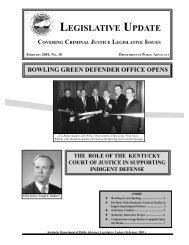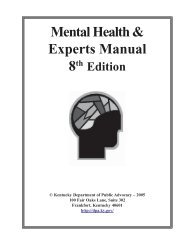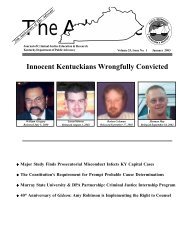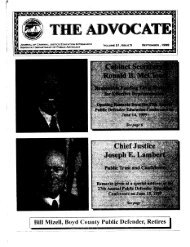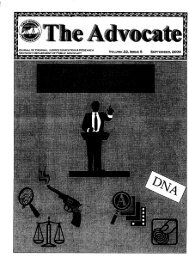May 2002 - Department of Public Advocacy
May 2002 - Department of Public Advocacy
May 2002 - Department of Public Advocacy
Create successful ePaper yourself
Turn your PDF publications into a flip-book with our unique Google optimized e-Paper software.
Continued from page 27<br />
• What about Montessori Schools or day cares The Kentucky<br />
Court <strong>of</strong> Appeals answered in the affirmative as to<br />
the former, but seemingly implied the negative as to the<br />
latter. In Brimmer v. Commonwealth, Ky. App., 6 S.W.3d<br />
858 (1999) the Court stated:<br />
THE ADVOCATE Volume 24, No. 3 <strong>May</strong> <strong>2002</strong><br />
• Try to persuade the district court judge not to pass over<br />
the issue <strong>of</strong> whether a building is a school on the ground<br />
that it is “for the jury to decide.” Whether a building is a<br />
“school” is a question for the Court, not the jury. In<br />
Brimmer, the Court <strong>of</strong> Appeals stated that “the circuit court<br />
correctly analyzed the common dictionary definition <strong>of</strong><br />
‘school’ and determined that ABC constitutes a ‘school.’”<br />
The circuit court had ruled that the Montessori School<br />
was a school building used primarily for classroom instruction<br />
following a hearing in which testimony was taken.<br />
The issue was not submitted to a jury for decision, but was<br />
considered a question <strong>of</strong> law by the circuit judge, and ultimately<br />
the Court <strong>of</strong> Appeals. The district judge is no less<br />
empowered than a circuit judge to answer questions <strong>of</strong><br />
law, and can make such a ruling if the evidence warrants it.<br />
The testimony presented here before the circuit<br />
court shows that ABC’s primary focus is<br />
educating children ages three through nine.<br />
While ABC once was a day care center, for<br />
the last eight years it has been a Montessori<br />
school. The owner/director <strong>of</strong> ABC is a certified<br />
Montessori teacher who received training<br />
through the University <strong>of</strong> Kentucky.<br />
ABC’s informational brochure describes it as<br />
a private school open to all children regardless<br />
<strong>of</strong> race, nationality or financial status.<br />
ABC’s curriculum includes reading, mathematics,<br />
geography, history, practical life skills,<br />
science, creative development in art, dramatics,<br />
creative expression and music…[Emphasis<br />
added.]<br />
The director further testified that ABC’s program<br />
is a total learning program similar to primary<br />
education in public schools…<br />
The factors listed in Brimmer were meant to distinguish a<br />
school from a day care. If a day care were also a “school,”<br />
there would be no reason for the Court <strong>of</strong> Appeals to so<br />
distinguish it.<br />
• Consider speaking with the owner/director <strong>of</strong> the school<br />
or day care and inquire about any laws or regulations under<br />
which the enterprise operates. Sometimes, federal or<br />
state law will mandate that a day care identify with particularity<br />
the functions it intends to perform. It may be illegal<br />
for a day care to function as a school, and vice-versa.<br />
Check the brochures, yellow pages, newspaper adds or<br />
websites <strong>of</strong> any facility which holds itself out to be a day<br />
care or school. If you are able to secure the answers you<br />
want, you can always subpoena the director to the preliminary<br />
hearing, and provide the Court with the evidence that<br />
the institution is not a school.<br />
Okay, so there are no earth-shattering or novel ideas contained<br />
in any <strong>of</strong> the above. Most if not all <strong>of</strong> the concepts<br />
above addressed have been employed by you defense lawyers<br />
out there for years. Nevertheless, this article can be a<br />
handy, brief checklist <strong>of</strong> issues and ideas to raise (or not<br />
raise, depending on your case) at a prelim. If nothing else, it<br />
can serve as a “tickler” so you do not forget any possible<br />
defenses or case problems that you will have to overcome.<br />
{If you would like to see more <strong>of</strong> these type <strong>of</strong> articles – or<br />
less <strong>of</strong> them – please notify the District Court Column Contributing<br />
Editor <strong>of</strong> The Advocate, Jeff Sherr. The goal <strong>of</strong> the<br />
column is to be as worthwhile and user-friendly as possible.<br />
This goal can only be accomplished if readers let us know<br />
what is working, and what is not.)<br />
Brian “Scott” West<br />
Assistant <strong>Public</strong> Advocate<br />
907 Woldrop Drive<br />
Murray, KY 42071<br />
Tel: (270) 753-4633 Fax: (270) 753-9913<br />
E-mail: bwest@mail.pa.state.ky.us<br />
It is not the critic that counts; not the man who points out how the strong man stumbles. Or where the<br />
doer <strong>of</strong> deeds could have done better. The credit belongs to the man who is actually in the arena, whose<br />
face is marred by dust and sweat and blood; who strives valiantly; who errs, and comes short again and<br />
again, because there is no effort without error and shortcoming; who knows the great enthusiasms, the<br />
great devotions; who spends himself in a worthy cause; who at best knows in the end the triumph <strong>of</strong> high<br />
achievement. And at worst, if he fails, at least fails while daring greatly, so that his place shall never be<br />
with those cold and timid souls who know neither victory nor defeat.<br />
— President Theodore Roosevelt, “The Man in the Arena”, Paris, 1910<br />
28



